Marriage is more than two individuals coming together.
There is a sacred goal behind it, and it’s the responsibility
of both partners to pursue it together.
MARRIAGE WITH A PURPOSE
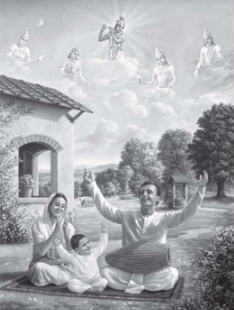
There are many purificatory processes for advancing a human being to spiritual life. The marriage ceremony, for example, is considered to be one of these sacrifices. It is called vivaha-yajna. . . . The Lord says here that any sacrifice that is meant for human welfare should never be given up. Vivaha-yajna, the marriage ceremony, is meant to regulate the human mind so that it may become peaceful for spiritual advancement. (Bg. 18.5, purport)
Marriage based on the principles of religious life is therefore current in all civilized human society because that is the way for restricted sex life. This restricted, unattached sex life is also a kind of yajna because the restricted householder sacrifices his general tendency toward sense gratification for higher, transcendental life. (Bg. 4.26, purport)
The Vedas prescribe, therefore, sacred marriage for regulated sense gratification. Thereby one is gradually elevated to the platform of release from material bondage, and the highest perfection of liberated life is to associate with the Supreme Lord. (Bg. 4.31, purport)
Marriage, or the combination of a man with a woman, is necessary for progeny, but it is not meant for sense enjoyment. In the absence of voluntary restraint, there is propaganda for family planning, but foolish men do not know that family planning is automatically executed as soon as there is search after the Absolute Truth. (SB 1.2.10,purport)
Marriage means taking complete charge of a woman and living peacefully without debauchery. At the present moment, however, debauchery is unrestricted. (SB 4.26.6, purport)
VEDIC MARRIAGES
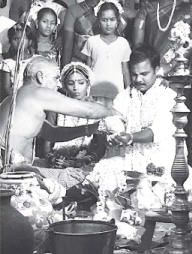
The general procedure of Vedic marriage is that a father offers his daughter to a suitable boy. That is a very respectable marriage. A boy should not go to the girl’s father and ask for the hand of his daughter in marriage. That is considered to be humbling one’s respectable position. (SB 3.22.13, purport)
There are different kinds of marriages, of which the first-class marriage is held by inviting a suitable bridegroom for the daughter and giving her in charity, well dressed and well decorated with ornaments, along with a dowry according to the means of the father. (SB 3.22.15, purport)
There are eight forms of marriage mentioned in the scripture Manu-småti, but only one process of marriage, brahma or rajasika marriage, is now current. Other kinds of marriage by love, by exchange of garlands, or by kidnapping the bride are now forbidden in this Kali age. (SB 3.22.16, purport)
SIGNIFICANCE OF GOTRA AND ASTROLOGY
The custom in Vedic society is to examine the horoscopes of a girl and boy being considered for marriage to see whether their combination is suitable. Vedic astrology reveals whether one has been born in the vipra-varna, kshatriya-varna, vaishya-varna or Shudra-varna, according to the three qualities of material nature. This must be examined because a marriage between a boy of the vipra-varna and a girl of the Shudra-varna is incompatible; married life would be miserable for both husband and wife. Consequently, a boy should marry a girl of the same category. Of course, this is trai-gunya, a material calculation according to the Vedas, but if the boy and girl are devotees there need be no such considerations. A devotee is transcendental, and therefore in a marriage between devotees, the boy and girl form a very happy combination. (SB 6.2.26, purport)
If according to astrological calculations the boy and girl were compatible in every respect, the match was called yotaka and the marriage would be accepted. . . . Regardless of the affluence of the boy or the personal beauty of the girl, without this astrological compatibility the marriage would not take place. (SB 9.18.23, purport)
WHO IS A DHARMA-PATNI?
A real wife is dharma-patni. That is, a woman accepted in marriage by ritualistic ceremony is called dharma-patni, which signifies that she is accepted in terms of religious principles. Children born of dharma-patni . . . inherit the property of the father, but children born of a woman who is not properly married do not inherit the father’s property. The word dharma-patni also refers to a chaste wife. A chaste wife is one who never had any connection with men before her marriage. (SB 4.26.16, purport)
DUTY OF PARENTS
It is the duty of a father and mother to arrange for the marriage of their sons and daughters. . . . Sons and daughters should not be allowed freedom to intermingle with the opposite sex unless they are married. This Vedic social organization is very good in that it stops the promulgation of illicit sex life, or varna-sankara, which appears under different names in this present day. (SB 4.27.8, purport)

BROKEN MARRIAGES
In this age illicit connection with women will render many women and children uncared for. Circumstantially, the women will try to become independent of the protection of men, and marriage will be performed as a matter of formal agreement between man and woman. (SB 1.16.21, purport)
A girl of godly quality should be handed over to a boy of godly quality. A girl of demoniac quality should be handed over to a boy of demoniac quality. Then they will be happy. But if the girl is demoniac and the boy is godly, then the combination is incompatible; they cannot be happy in such a marriage. At the present moment, because boys and girls are not married according to quality and character, most marriages are unhappy, and there is divorce. (SB 3.24.15, purport)
IDEAL MARRIAGES
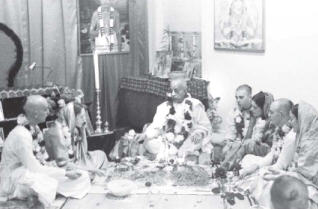
Srila Prabhupada was in New York, and he installed the first Radha-Krishna Deities and the deities of Jagannatha-Baladeva-Subhadra. He initiated some devotees and married some devotees. So Srila Prabhupada was marrying me to Advaita, and my mother first said Srila Prabhupada told her what to say she said, “My girl was so long under my guidance; now I entrust this girl under your guidance.” And Advaita said, “I accept this girl for life.” And Balai says, “I accept you as my husband, to serve you through my whole life.” Then Srila Prabhupada said, “You are promising before Radha and Krishna so you must take this responsibility. I speak to the husbands especially. According to Vedic principles, a woman is always to be given protection. They have no freedom. Women are like children. If you give freedom to a child it means death to them. They are tender, feeble, and weak. People will exploit them. So long as a girl is young she is under the protection of her parents. In India girls don’t mix with boys. Then she is handed over to a suitable boy to take charge of her. In old age the husband leaves home and takes sannyasa. There is no question of divorce or separation. If there is any misunderstanding between husband and wife it should be neglected, not taken seriously. Just like if there is fighting between two goats it should not be taken seriously; they cannot hurt each other. If there is a thunder sound in the morning it should not be taken seriously; there is no rain. Nobody should go to court. No question of divorce. It is lifelong. You are promising before the Supreme Lord Krishna. If you break this promise there will be serious reaction. As a sannyasi I am not to perform marriage ceremonies, but for the benefit of my disciples I am doing it. Please remember your responsibility and be happy and chant Hare Krishna. There is no need of abstinence, but don’t beget children like cats and dogs. A person in Krishna consciousness must be serious about his position. If you can produce children in Krishna consciousness, then you may have hundreds of children; otherwise no children.
By Srimati Balai, from Memories of Srila Prabhupada
Man and woman both seek sexual enjoyment, and when they are united by the ritualistic ceremony of marriage, they are happy for some time, but finally there is dissension, and thus there are so many cases of separation and divorce. Although every man and woman is actually eager to enjoy life through sexual unity, the result is disunity and distress. Marriage is recommended to give men and women a concession for restricted sex life, which is also recommended in Bhagavad-gita by the Supreme Personality of Godhead. Dharma-viruddho bhutesu kamo ’smi: sex life not against the principles of religion is Krishna. (SB 7.13.26, purport)
By the Vedic injunction, the wife is accepted as the better half of a man’s body because she is responsible for discharging half of the duties of the husband. . . . When a man becomes qualitatively like the cats and dogs, he forgets his duties in cultivating spiritual values, and thus he accepts his wife as a sense gratificatory agency. When the wife is accepted as a sense gratificatory agency, personal beauty is the main consideration, and as soon as there is a break in personal sense gratification, there is disruption or divorce. But when husband and wife aim at spiritual advancement by mutual cooperation, there is no consideration of personal beauty or the disruption of so-called love. Marriage is actually a duty performed in mutual cooperation as directed in the authoritative scriptures for spiritual advancement. (SB 3.14.19, purport)
INTERCASTE MARRIAGES IN VEDIC TIMES
Kardama Muni was a brahmana, whereas Emperor Svayambhuva was a kshatriya. [Still Kardama Muni married Devahuti, the daughter of Svayambhuva.] Therefore, inter-caste marriage was current even in those days. The system was that a brahmana could marry the daughter of a kshatriya, but a kshatriya could not marry the daughter of a brahmana. We have evidences from the history of the Vedic age that Sukracarya offered his daughter to Maharaja Yayati, but the King had to refuse to marry the daughter of a brahmana; only with the special permission of the brahmana could they marry. Intercaste marriage, therefore, was not prohibited in the olden days, many millions of years ago, but there was a regular system of social behavior. (SB 3.21.285, purport)
THE DOWRY SYSTEM
The dowry system is not illegal. It is a gift given to the daughter by the father to show good will. If the father is unable to give a dowry, he must at least give a fruit and a flower. God can also be pleased even by a fruit and a flower. (SB 3.22.23, purport)
An affectionate father, during the marriage of his daughter, would give her as much as possible.Immediately after the marriage, the daughter goes to her husband’s house, and it is also a custom for the brother of the bride to accompany his sister and brother-in-law to exhibit affection for her. (SB 10.1.31–32, purport)
LORD BRAHMA ON WEDDING CARDS
Lord Brahma, the creator of the universe, is interested in good progeny. Therefore unless he is pleased, one cannot get a suitable wife. In fact, Lord Brahma is worshiped in marriage ceremonies. In India even today, wedding invitations are still issued with a picture of Lord Brahma on the face of the card. (SB 5.2.15, purport)
SVAYAMVARA ROYAL MARRIAGES
Exceptionally qualified daughters of powerful kings were allowed to make a choice of their own bridegrooms in open competition, and such ceremonies were called svayamvara, or selection of the bridegroom. Because the svayamvara was an open competition between the rival and valiant princes, such princes were invited by the father of the princess, and usually there were regular fights between the invited princely order in a sporting spirit. But it so happened that sometimes the belligerent princes were killed in such marriage-fighting, and the victorious prince was offered the
trophy princess for whom so many princes died. (SB 1.10.29, purport)
HOW KRISHNA MARRIES
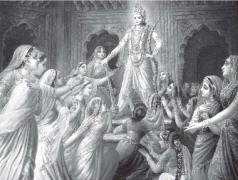
Krishna is exactly like us, and He has all the propensities of an individual living being in fullness. He marries exactly like us, but His marriage is neither mundane nor limited by our experience in the conditioned state. His wives, therefore, appear like mundane women, but factually they are all transcendental liberated souls, perfect manifestations of internal energy. (SB 1.11.35, purport)
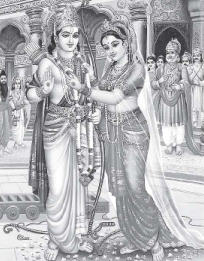
In almost all cases, the kshatriya king has to secure a wife by fighting or kidnapping. This sort of behavior for a kshatriya is praiseworthy in the sense that a kshatriya must show his power of chivalry to his would-be wife so that the daughter of a kshatriya can see the valor of her would-be husband. Even the Personality of Godhead Sri Rama displayed such a spirit of chivalry during His marriage. He broke the strongest bow, called Haradhanur, and achieved the hand of Sitadevi, the mother of all opulence. The kshatriya spirit is displayed during marriage festivals, and there is nothing wrong in such fighting. Lord Sri Krishna discharged such responsibility fully because although He had more than sixteen thousand wives, in each and every case He fought like a chivalrous kshatriya and thus secured a wife. To fight sixteen thousand times to secure sixteen thousand wives is certainly possible only for the Supreme Personality of Godhead. (SB 1.16.26-30, purport)
